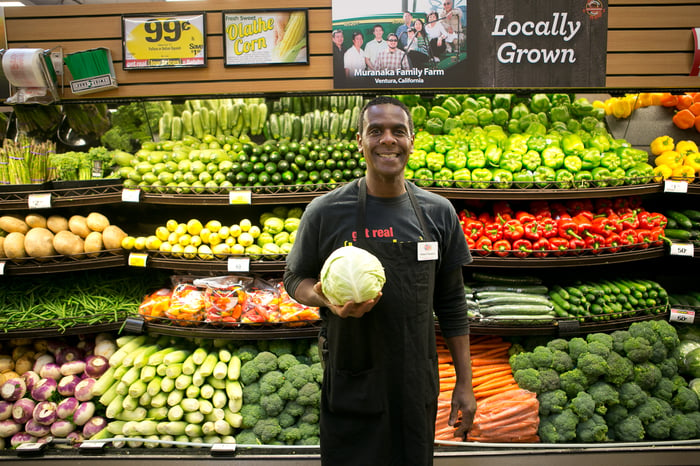The biggest grocery store chain in the country is about to get a whole lot bigger. Kroger (KR -1.34%) will be acquiring the second-biggest stand-alone chain, Albertsons (ACI 0.32%), in a $24.6 billion deal that will create a massive supermarket giant.
The combined company will generate $210 billion in annual sales and have around 5,000 stores and 700,000 employees, which will put it within striking distance of Walmart. Yet because it will also lessen competition in some markets, as Kroger and Albertsons have overlapping geographic sprawl, it's likely this merger will get close antitrust scrutiny, and will probably result in asset sales.
Warren Buffett's Berkshire Hathaway (BRK.A -0.29%) (BRK.B -0.10%) owns a 7.3% stake in Kroger's worth some $2.26 billion dollars. Let's see if it's worthwhile for investors to buy into this grocery store chain as well.

Image source: Kroger.
Concentrating power
Kroger is the largest pure play supermarket with $138 million in revenue, though Walmart, with $265.8 billion in combined Walmart and Sam's Club grocery sales last year, generates more money. That's why merging with Albertsons $71.9 billion grocery sales across all of its banners makes the supermarket merger such a potent threat.
|
Grocery store |
2021 Revenue |
Market Share %* |
|---|---|---|
|
Walmart |
$265.8 billion** |
21.6% |
|
Kroger |
$137.9 billion*** |
8.8% |
|
Costco |
$77.3 billion |
6.4% |
|
Albertsons |
$71.9 billion+ |
4.7% |
|
Ahold Delhaize |
$53.7 billion |
4.3% |
|
Amazon |
$19.2 billion++ |
2.4% |
*Market share by total dollars spent. **Walmart and Sam's Club. *** Kroger, Harris Teeter, Ralphs, and Fred Meyer. +Albertsons, Safeway, Acme, Kings, and more.++Amazon online and physical stores, including Whole Foods Market.
Because a combined Kroger and Albertsons would give the grocery giant considerable leverage in negotiating prices with suppliers, some fear it will be able to raise prices at a time when consumers are already struggling with rising food and energy costs.
It's estimated that 60% of all grocery sales are concentrated in just five companies -- Walmart, Kroger, Amazon, Albertsons, and Ahold Delhaize. That doesn't include Costco, BJs Wholesale Club, or dollar stores like Dollar General and Dollar Tree, which are investing more heavily in fresh food and consumables.
Kroger, though, says it intends to invest about $500 million in the synergies realized from the merger to lower prices for consumers, with another $1.3 billion going to "enhance customer experience" in the Albertsons chain, and another $1 billion going to raising worker wages and benefits.
Becoming the place to shop
Albertsons was taken private in 2006 by Cerberus Capital Management and brought back to the public markets in 2020. Since then, Albertsons stock has gained 70% in value compared to a 15% gain by the S&P 500 (Kroger is up almost 35% since then).
Both Albertsons and Kroger have been investing heavily in their online presence and digital capabilities. Albertsons has significant omnichannel and fulfillment infrastructure in place, such as almost 2,100 curbside pickup locations and delivery, while its loyalty member program Albertsons for U has 31 million members.
Kroger has similar competitive advantages, and has already revamped its own loyalty program Boost by Kroger, which is a paid platform similar to Walmart+ or Amazon Prime.
Kroger will pay $34.10 per share for Albertsons, a 32.8% premium to Albertson's closing price on Oct. 12, before the merger was reported. The final payment amount may also be reduced depending upon the number of stores Albertsons needs to sell to win regulatory approval. Albertsons will pay its shareholders a special cash dividend of about $6.85 per share.
Worth a bite
The overall value of the supermarket business, however, is that despite operating at very thin margins, it is a simple and durable business. Mark Twain once observed: "buy land -- they're not making any more of it," a sentiment that can also be applied to grocery stores, because people will always need to eat. Food stocks can be a very good buy.
And Kroger's stock looks like a good value. Shares trade at 13 times trailing earnings, 10 times next year's estimates, and a fraction of sales. Going for just 15 times the free cash flow it produces, Kroger is not a bargain-basement stock, but still a discounted value.
Analysts were forecasting steady revenue growth for the supermarket giant, expecting sales to hit $159 billion by 2026, and had a $52 price target on its shares, suggesting 21% upside over the next year.
This merger won't be a quick one, and may see significant concessions offered to pass regulatory scrutiny, but Kroger is a grocery star that investors should consider putting in their portfolios.




